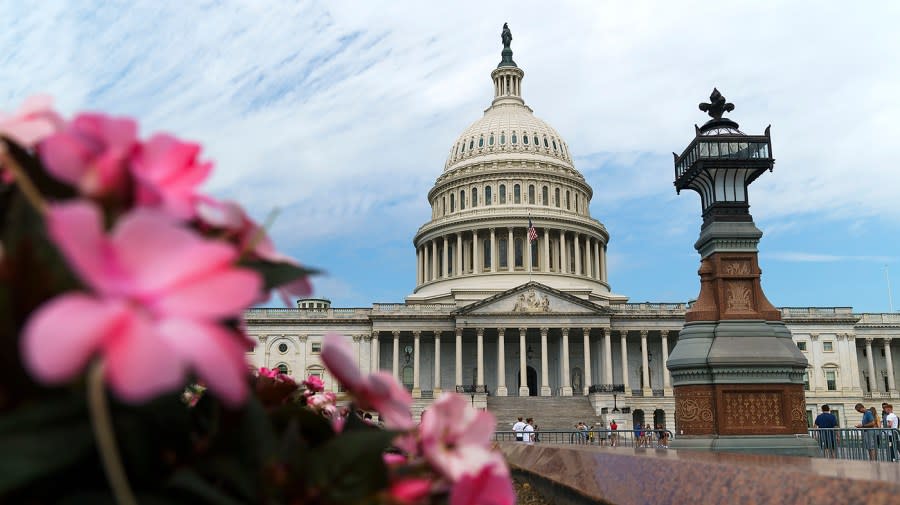Senate set to return to a drama-filled September

- Oops!Something went wrong.Please try again later.
The Senate returns Tuesday with less than four weeks to prevent the first government shutdown in years.
The countdown and high stakes set up a drama-filled September, and lawmakers are already pointing fingers over who to blame if government funding lapses.
Senators are also uneasily eyeing the House, where shutdown talk from some hard-line conservatives and a possible impeachment inquiry threaten to scramble an already jampacked schedule for September.
“We just don’t have very much time to get everything done,” Sen. Tammy Duckworth (D-Ill.) told reporters Friday, adding that she’s concerned the government could see a shutdown in the weeks ahead.
“But this is really going to be driven by the House,” she added, putting the onus on Republicans in the lower chamber. “They’re the ones that are going to bring it upon the country.”
Democrats have been ramping up criticism of House Republicans as the conference pursues more aggressive spending cuts for fiscal 2024 — well below spending rates agreed upon in a budget cap deal between President Biden and Speaker Kevin McCarthy (R-Calif.) months back.
“When the Senate returns next week, our focus will be on funding the government and preventing House Republican extremists from forcing a government shutdown,” Senate Majority Leader Chuck Schumer (D-N.Y.) said in a letter Friday.
“The only way to avoid a shutdown is through bipartisanship, so I have urged House Republican leadership to follow the Senate’s lead and pass bipartisan appropriations bills,” Schumer said.
Senate Minority Leader Mitch McConnell (R-Ky.) didn’t hold back in discussing some of the hurdles Congress faces in averting a shutdown later this month, recently describing the current state of play as “a pretty big mess.”
“The Speaker and the president reached an agreement which I supported in connection with raising the debt ceiling to set spending levels for next year,” he said in Kentucky on Wednesday, shortly before appearing to freeze while taking questions from reporters.
“The House then turned around and passed spending levels that were below that level,” he said. “Without stating an opinion about that, that’s not going to be replicated in the Senate.”
Before Congress left for the August recess, negotiators in both chambers advanced legislation laying out hundreds of billions of dollars in proposed funding for the next fiscal year — but at very different levels.
In the Democratic-led Senate, negotiators on both sides marked up their spending bills closer to levels agreed upon in the budget cap deal struck between Biden and McCarthy months ago, while Republicans went further below the negotiated levels amid pressure from hard-line conservatives demanding steeper cuts.
To buy time for a larger spending deal, leaders from both parties have been eyeing a short-term funding patch, known as a continuing resolution (CR), to freeze funding at levels worked out as part of a bipartisan agreement in the last Congress. But some Republicans aren’t warm to the idea of voting to continue funding at limits last hashed out when Democrats held control of both chambers and that many in the conference agree are too high.
In recent weeks, hard-line conservatives have also made multiple demands related to issues like the border and what they describe as the “weaponization” of the Department of Justice as conditions to secure their support for a CR — putting pressure on McCarthy to hold a firm stance in extracting concessions from Democrats to prevent a shutdown.
The party has additionally seen internal rifts over the issue of Ukraine aid, as the White House’s requested funding for more assistance to aid the nation in its war against Russia meets opposition from conservatives — adding to a list of potential add-ons to a CR in the House that would greatly hurt its chances of passage in the upper chamber.
Lawmakers also have other significant legislative priorities competing for time as they juggle deadlines for the National Flood Insurance Program, the Federal Aviation Administration and the farm bill, among other pressing items.
There’s also the House GOP-led push for an impeachment inquiry that has been taking up more oxygen on Capitol Hill, with Rep. Marjorie Taylor Greene (R-Ga.) announcing this week that she would go against a stopgap funding bill if the House fails to vote to open the impeachment inquiry.
The various demands underscore the balancing act McCarthy faces in keeping together the slim majority’s various factions amid the contentious funding process, while also finding common ground with Democrats to keep the government open.
At the same time, some hard-line conservatives have already signaled openness to the idea of a shutdown if it comes to it.
“If a shutdown occurs, then so be it if they’re not gonna stick to what [McCarthy] agreed to, which is starting on a path of financial security, which we don’t have,” Rep. Ralph Norman (R-S.C.) recently told The Hill.
But that doesn’t mean Republicans in the upper chamber are on board with the prospect.
“My guess is we will have a lot of screaming and shouting and we’ll end up shutting down the government,” Sen. Mitt Romney (R-Utah) said during an appearance on “KSL Sunday Edition” last week. “And a lot of people will be inconvenienced or hurt as a result of doing that. But we’ll do it.”
“And by the way, we’ll shut down government and then we’ll open it,” he added. “It’s not like that means we win. We’re going to shut it down to show that we’re fighting and making noise.”
For the latest news, weather, sports, and streaming video, head to The Hill.

